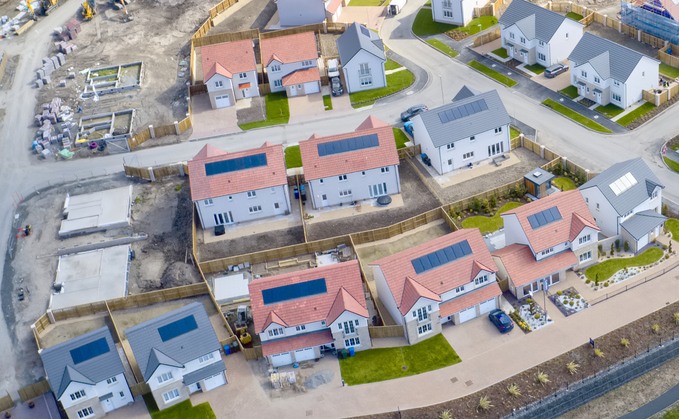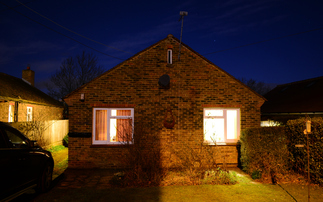Credit: iStock
Rights Community Action and Good Law Project launch legal action against government policy that restricts councils' ability to set higher energy efficiency standards for new homes
The government is facing yet another legal challenge over its net zero policies, this time based on claims a recent Ministerial statement places a "roadblock" on councils setting higher energy efficiency standards for new housing developments.
Rights Community Action today announced it had launched a legal challenge against the Department for Levelling Up, Housing and Communities (DLUHC) over a recent Written Ministerial Statement they argue unlawfully undermines local authority powers.
The challenge, which is being supported by The Good Law Project, also argues the statement goes against the objectives of the Climate Change Act 2008 - which requires the government to seek to reduce greenhouse gas emissions in line with legally binding Carbon Budgets - and the Environment Act 2021, which requires new policies to be assessed for their environmental impacts.
The government's Statement sets out that councils should not seek to set energy efficiency standards for new developments that go beyond national building regulations without a strong "robustly costed" rationale, warning additional standards can add costs and complexity that could hold back house building.
However, some local authorities have argued the rules restrict their ability to impose more demanding standards on new developments that would help them deliver on their own local climate goals.
Good Law Project's legal manager, Ian Browne, said it was launching legal action against the government's statement in order to "make it easier for councils to be at the forefront of unlocking the next generation of green homes".
"In the midst of a climate emergency and with millions of households struggling to pay their heating bills, we think the government's roadblock to delivering more energy efficient homes is not just illogical, but unlawful," he said.
Today's announcement follows a joint letter sent to DLUHC Secretary Michael Gove last week by over 50 local councils and 12 campaign groups led by the Town and Country Planning Association, which criticised the "unnecessarily draconian" Written Ministerial Statement.
The letter - which was signed by the likes of Friends of the Earth, the Good Homes Alliance, and the Campaign to Protect Rural England - urged the government to clarify the policy "by making clear that local planning authorities can adopt standards in local plans which… go beyond building regulations so long as such policy is robustly evidenced and viable".
The Written Ministerial Statement was issued on 13 December last year by DLUHC Minister Baroness Penn, who wrote that the government "does not expect plan-makers to set local energy efficiency standards for buildings that go beyond current or planned building regulations".
"The proliferation of multiple, local standards by local authority area can add further costs to building new homes by adding complexity and undermining economies of scale," the statement argued.
It went on to state that "any planning policies that propose local energy efficiency standards for buildings that go beyond current or planned buildings regulation should be rejected at examination if they do not have a well-reasoned and robustly costed rationale".
Such a rationale should ensure the "development remains viable" and the impact on housing supply and affordability is taken into account, the statement added.
The UK has one of the most inefficient housing stocks in Europe, and critics have argued that repeated delays to new green home standards means properties are still being built today that will need to be retrofitted with improved levels of energy efficiency and green heating systems if the UK is to meet its statutory climate targets.
The government is set to bring in the Future Homes Standard to ensure all new homes built from 2025 are 'zero carbon ready' with higher levels of energy efficiency compared to previous standards. The standards also effectively ban the installation of gas boilers in new homes.
But critics have argued the standards are not ambitious enough, and do not, for example, mandate the installation of solar panels or other clean technologies or require new properties to adhere to the most ambitious passivhaus standards.
Naomi Luhde-Thompson, director of Rights Community Action, said that in blocking councils from going further than national requirements for energy efficiency in new homes, the government was "dictating a sub-standard approach" and "failing to apply its own environmental assessment procedures".
"The government has again acted to undermine its own policy on net zero homes, making our vital carbon reduction targets even harder to achieve," she said. "This is the first test of the government's own Environment Act 2021 policy principles, and it has woefully underperformed. Building homes that are warm, generate their own electricity, and provide safety and security to people should be the priority of any practical, forward-thinking and knowledgeable government."
DLUHC was considering a request for comment at the time of going to press.
However, Ministers and some within the housing industry have in the past argued that allowing local authorities to set their own energy efficiency standards would create a patchwork of rules across the UK that would ultimately drive up the cost of new housing projects and make it harder for developers to establish a nationwide approach for delivering greener homes.
The legal challenge is the latest in a series of cases brought against the government over its net zero agenda, with a separate case being heard at the High Court last week over a series of claims that its current carbon reduction plans are inadequate and in breach of the UK's Climate Change Act.
Want to understand what is going on at the cutting edge of sustainability? Check out BusinessGreen Intelligence - the premier information for professionals focused on the UK's green economy.










